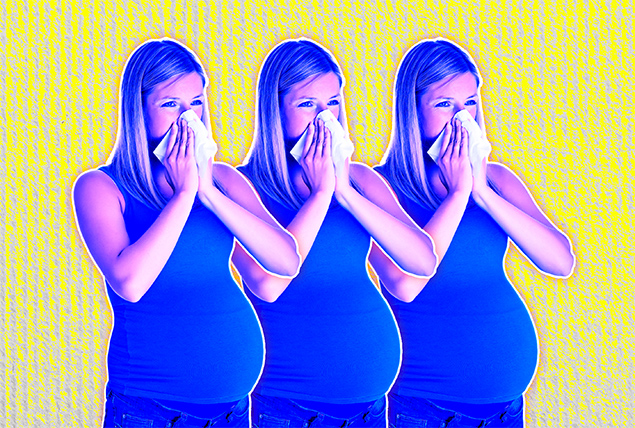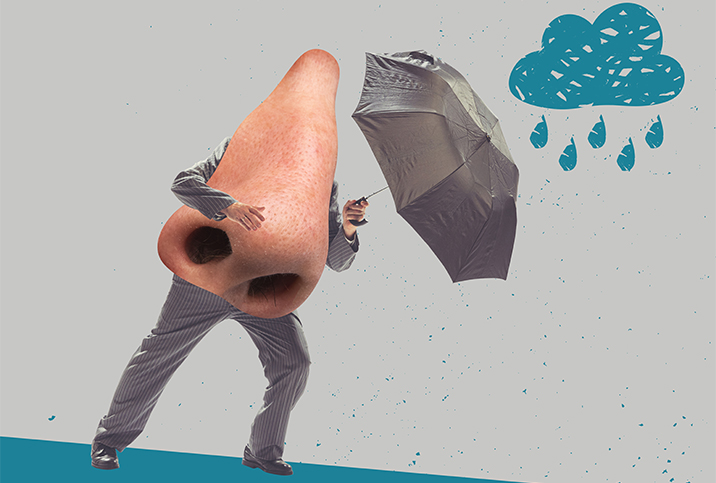How To Safely Manage Allergies While Pregnant

Pregnancy can bring about a host of physical and psychological changes, from swollen ankles and shinier hair to sudden food cravings. Pregnancy might even affect how you fare during allergy season.
We talked to experts to better understand why allergies and asthma might worsen during pregnancy and how expectant women can safely manage symptoms.
How do allergies change during pregnancy?
"(Some) people experience worse allergies, and others either stay the same or improve. Research shows that one-third worsen, one-third stay the same and one-third improve," said Monte Swarup, M.D., an OB-GYN in Chandler, Arizona, and the founder of HPV HUB. "It all depends on the individual and the severity of their allergies."
Pregnancy can even spur new allergies, usually in the form of environmental allergies. But that's much more likely to happen if you already have some triggers, Swarup said. For those who do experience new or worsening symptoms, things usually improve postpartum.
How does asthma change during pregnancy?
The same is true of asthma, which frequently occurs alongside allergies, said Erin Reigh, M.D., an allergy and clinical immunology provider at Dartmouth Hitchcock Medical Center in Lebanon, New Hampshire.
About one-third of pregnant people have worse symptoms, another third see no change and another third improve. Again, if you've got it bad before pregnancy, you'll have a harder time while pregnant.
"Most asthma flares that occur in pregnancy occur in the late second trimester and third trimester," said Reigh, who is also an assistant professor of medicine at the Geisel School of Medicine, Dartmouth. "Fortunately, most of these patients go back to their pre-pregnancy asthma control within three months of delivery."
How do hormones affect allergies during pregnancy?
Experts believe there's a clear interplay between hormones, allergies and asthma, especially in women.
In part, that's likely because of how hormones such as estrogen impact the immune system, including histamine receptors, which play a key role in the inflammatory response, said Michael Green, M.D., a California-based OB-GYN and the chief medical officer at Winona, a telehealth company for women in menopause. But the exact mechanism is still a bit of a mystery.
"It is true that girls are more likely to develop allergies after puberty. Studies have also shown that some women experience an increase in asthma symptoms the week before their periods, so we definitely see a pattern with hormones affecting allergic diseases," Reigh said. "However, we also see women newly develop asthma after menopause, so studies have been conflicting on the exact role of female hormones in these conditions."
'The pregnant body achieves naturally what decades of transplant medicine have yet to perfect.'
There's limited knowledge of the phenomenon because it's difficult to perform studies on pregnant people safely, according to Ahmad Sedaghat, M.D., the director of the division of rhinology, allergy and anterior skull base surgery at the University of Cincinnati College of Medicine. That requires scientists to rely primarily on animal studies.
"It's still not clear exactly how these hormones are having these effects. Studies in mice suggest that estrogen might 'supercharge' white blood cells, so to speak, allowing them to have a greater inflammatory effect when exposed to an allergen compared to someone without these hormones present," Reigh said.
How do immune system changes in pregnancy affect allergies?
During pregnancy, the immune system becomes more latent to prevent the body from rejecting the fetus, Green and Reigh said.
"Pregnancy's effect on the immune system is one of the most fascinating topics in immunology. At its most basic, our immune system's job is to tell 'self' from 'non-self' and to attack stuff in the 'non-self' category," Reigh explained. "It's why people who have had organ transplants have to be on immune suppression. Even tiny differences between organs can lead to rejection.
"And yet, in a successful pregnancy, the immune system happily ignores the growing fetus even though half of its DNA belongs to someone else. The pregnant body achieves naturally what decades of transplant medicine have yet to perfect."
The immune system accomplishes this by shifting the balance of T cells, a type of white blood cell that helps fend off infection. It does so by reducing the number of T cells that fight viruses and increasing those that make antibodies.
Although this behavior protects the growing fetus, it also makes you more susceptible to illness and allergic reactions.
"Allergies and autoimmune diseases like lupus, which are caused by the antibody-producing side of the immune system, can worsen in pregnancy," Reigh said. "Also, because the antiviral side of the immune system is suppressed in pregnancy, pregnant patients have a harder time fighting viruses like influenza and COVID-19."
Is it allergies or just pregnancy?
Allergy symptoms resemble those of another condition, "pregnancy rhinitis," which is also tied to hormonal fluctuations.
"Pregnancy rhinitis is a condition occurring in about 1 in 5 pregnancies where patients develop chronic nasal congestion, usually around the second trimester, which resolves within a few weeks of delivery," Reigh said. "This is not an allergy but may be due to increased blood flow triggered by pregnancy hormones like estrogen and progesterone."
So that stuffy nose pregnant women sometimes experience may not be allergies after all.
It's about more than simply increased blood flow. Swelling and softening of the mucous membranes and broadening nasal blood vessels may contribute, too, according to Neha Pathak, M.D., an Atlanta-based primary care doctor and chief physician editor at WebMD.
Besides congestion, pregnancy rhinitis can cause nosebleeds and post-nasal drip that might make you cough or gag while sleeping, Pathak said. A runny nose during pregnancy isn't fun, but at least it's temporary.
Pregnancy hormones can also cause "pregnancy nose," a phenomenon widely documented on TikTok.
While rhinitis is confined to the nose, allergies usually trigger other symptoms, Pathak said, such as sneezing, coughing, and itchy eyes or skin.
If you aren't sure what's causing your symptoms, experts advise talking to your doctor about what medications during pregnancy could help relieve your symptoms.
Can allergies during pregnancy affect your baby?
Experts said allergies are unlikely to harm the fetus since allergic antibodies don't cross the placenta. However, their symptoms could have an indirect impact. For example, persistent itchiness and post-nasal drip might interfere with a pregnant person's sleep, which might affect their overall health.
Or, on the other end of the spectrum, a severe reaction at any time during pregnancy could inhibit blood and oxygen flow to the parent and fetus, potentially putting both of their lives at risk.
"Anaphylaxis is a life-threatening, severe allergic reaction, and it may include symptoms such as hives all over, swelling of the tongue and throat, trouble breathing and drop in blood pressure," Reigh said. "In pregnant patients, this can also include reduced blood flow to the placenta, which can lead to complications like fetal brain damage or miscarriage."
Anaphylaxis can happen in pregnant people for the same reasons it occurs in anyone, with medications, foods and bee stings being the most common. If you experience anaphylaxis, treat it immediately with epinephrine—or an "epi-pen"—and call 911.
"Lying down can help improve blood flow to the heart during anaphylaxis, but pregnant patients should lie on their left side so the uterus doesn't press on the veins that return blood to the heart," Reigh said.
Asthma is also associated with pregnancy complications, Reigh and Pathak said, including preeclampsia, preterm birth and congenital malformations. Keeping asthma under control before and during pregnancy appears to decrease these risks.
Does having allergies increase your baby's risk of developing allergies?
Kids born to parents with allergies are more likely to have allergies themselves. That's mostly due to genetics. But inflammation caused by a parent's allergic reaction could also play a part.
"The presence of active allergic inflammation in the mother can potentially influence the developing baby's immune system to make it 'pro' allergy—in other words, to potentially put the baby at higher risk for development of allergies," Sedaghat said.
Research also indicates exposure to tobacco and alcohol in utero increases a baby's risk of sensitivities and allergies, a 2009 study suggested. However, contrary to popular misconceptions, a parent's food choices are not likely a factor.
"When it comes to food allergies like peanut allergies, the latest research suggests that eating peanuts while pregnant not only doesn't trigger peanut and other allergies in your baby, but it may actually prevent them," Pathak said. "So as long as you're not personally allergic to peanuts, there's no reason to skip them. This is also the case for dairy and other foods that often cause allergies in children."
If you have food allergies or sensitivities, Pathak said, it's best to speak with your doctor about how to handle them while pregnant or breastfeeding.
Otherwise, there's probably no need to avoid foods other than those specified by organizations such as the American Pregnancy Association (APA), including raw meat, most fish, deli meat, soft cheeses and unpasteurized milk.
How can you help prevent allergies?
Other than avoiding known allergens as much as possible, one of the best ways to reduce your risk of developing allergies is to allergy-proof your environment.
"Avoidance is the first step in controlling allergies and one of the safest options in pregnancy," Reign said. "I recommend focusing on the bedroom and making it a safe space from allergens because we spend so much time there sleeping."
To help reduce your risk of developing allergies, Reigh and Sedaghat suggested the following:
- Keep pets out of the bedroom. Even if you're not allergic to them, they can carry allergens from outside.
- Use allergen covers for your mattress, box spring and pillows. "A good allergy cover is made of a woven microfiber fabric, zips completely around the mattress, and has a pore size of six microns or less," Reigh said.
- Wash sheets once a week in hot water.
- Limit the use of carpeting and rugs in the house. Vacuum the soft surfaces you have once a week—more if you have pets—with a HEPA-filter vacuum.
- Take a shower before bed at night to avoid tracking particles, such as pollen and dust, into the bed.
How can you treat allergy symptoms safely while pregnant?
Experts stressed the importance of talking with your doctor before taking any allergy medications while pregnant or postpartum, as certain treatments can pose a risk for you or your baby.
Most likely, they'll recommend trying to reduce symptoms without medications first, Pathak said. Strategies to try to reduce your allergy symptoms during pregnancy include a saline (saltwater) nasal spray, nasal strips or nasal irrigation such as a neti pot.
Exercise might also help with nasal congestion, as it naturally constricts the blood vessels and opens the nasal passages, according to Reigh.
"Some medications, like antihistamines, are considered safe during pregnancy, while others may be harmful," Green said. "Some herbal remedies can also be dangerous during pregnancy, so please consult with your healthcare provider before using them. Non-pharmacological remedies, such as saline nasal sprays and steam inhalation, make safer alternatives."
Reigh noted that clinical trials typically exclude pregnant patients, so it is difficult to gauge precisely how safe certain drugs are for pregnant people.
Those medications considered safe for pregnant women, according to the American College of Obstetricians and Gynecologists (ACOG), include:
- Chlorpheniramine
- Dexchlorpheniramine
- Hydroxyzine
According to ACOG and experts, two newer oral antihistamines may also be safe: loratadine and cetirizine. As for inhaled steroids, which come as a nasal spray for seasonal allergies or an inhaler for asthma, budesonide is preferred, Reigh said.
Decongestants are generally considered safe to use after the second trimester unless you have high blood pressure, according to Cleveland Clinic. However, Pathak recommends avoiding them altogether.
"Research is ongoing on the impact of these medications for mom and baby, but they may impact blood flow to the baby," Pathak said.
Pregnant people can also continue with allergy shots they started before pregnancy, though it's not recommended to start allergy shots during pregnancy, Pathak added.
As for asthma, Reigh noted it's important to work with your medical team to keep your symptoms under control. Getting vaccinated against illnesses such as the flu and COVID-19 is vital, too, as viral infections are one of the most common asthma triggers.
"Inhalers for asthma have reassuring safety data, and studies show that the risks of not controlling asthma are greater than the risks of the medications used to treat it in pregnancy," Reigh said.
The bottom line
Generally, annoying as they are, allergies aren't cause for concern, our experts said. And taking precautions—using HEPA filters and keeping pets out of the bedroom—may help to prevent allergies from occurring at all.
But if symptoms affect your well-being, talk to your doctor to discuss safe strategies before using steroid nasal spray or your other pre-pregnancy allergy measures, to ensure their safety.


















